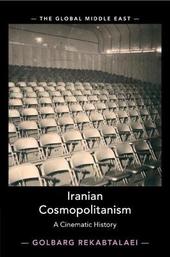
|
Iranian Cosmopolitanism: A Cinematic History
Paperback / softback
Main Details
| Title |
Iranian Cosmopolitanism: A Cinematic History
|
| Authors and Contributors |
By (author) Golbarg Rekabtalaei
|
| Series | The Global Middle East |
|---|
| Physical Properties |
| Format:Paperback / softback | | Pages:319 | | Dimensions(mm): Height 227,Width 150 |
|
| Category/Genre | Films and cinema |
|---|
| ISBN/Barcode |
9781108407465
|
| Classifications | Dewey:791.43655 |
|---|
| Audience | | Professional & Vocational | |
|---|
| Illustrations |
Worked examples or Exercises
|
|
Publishing Details |
| Publisher |
Cambridge University Press
|
| Imprint |
Cambridge University Press
|
| Publication Date |
24 September 2020 |
| Publication Country |
United Kingdom
|
Description
From popular and 'New Wave' pre-revolutionary films of Fereydoon Goleh and Abbas Kiarostami to post-revolutionary films of Mohsen Makhmalbaf, the Iranian cinema has produced a range of films and directors that have garnered international fame and earned a global following. Golbarg Rekabtalaei takes a unique look at Iranian cosmopolitanism and how it transformed in the Iranian imagination through the cinematic lens. By examining the development of Iranian cinema from the early twentieth century to the revolution, Rekabtalaei locates discussions of modernity in Iranian cinema as rooted within local experiences, rather than being primarily concerned with Western ideals or industrialisation. Her research further illustrates how the ethnic, linguistic, and religious diversity of Iran's citizenry shaped a heterogeneous culture and a cosmopolitan cinema that was part and parcel of Iran's experience of modernity. In turn, this cosmopolitanism fed into an assertion of sovereignty and national identity in a modernising Iran in the decades leading up to the revolution.
Author Biography
Golbarg Rekabtalaei is an Assistant Professor of Middle Eastern history at Seton Hall University, New Jersey. She received her Ph.D. in Near and Middle Eastern Civilizations from the University of Toronto in 2015. She is interested in the relationships between cinematic image and space, modernity, cosmopolitanism, urbanisation, nationalism, and revolutions. Her research specifically focuses on the role of cinema, in concrete form and onscreen, in facilitating cosmopolitan imaginations and hybrid subjectivities in early twentieth-century Tehran. Rekabtalaei was a Postdoctoral Teaching Fellow in the Department of History at North Carolina State University from 2015 to 2017.
Reviews'This book is a very important addition to social and cultural history of twentieth-century Iran that takes cinema as its prism of understanding Iranian modernity. Golbarg Rekabtalaei does a wonderful job of contextualising the experience of cinema not just through films but also across spaces of movie theatres, schools, and other urban public venues. She carefully analyses the State's cultural policies through the exchanges that take place within the sites of experience and encounter of the public with cinema and in response to it. The book, therefore, offers a fresh and original case study on emerging modern cosmopolitanism in the Iranian context.' Ali Mirsepassi, New York University 'Golbarg Rekabtalaei's brilliant historical work uncovers the roots of Iranian cinema in the international studios and figures that produced it as a cosmopolitan construct. Boldly suggestive, Rekabtalaei's findings reveal, in this deep history, a cosmopolitan national imaginary whose sense of self, ethics, conflicts, dilemmas and humanism substantiate the overwhelming appeal of Iranian cinema to global audiences today.' Negar Mottahedeh, author of Displaced Allegories: Post-Revolutionary Iranian Cinema 'Locating cinema history in the urban everyday of Tehran, in its multiethnic neighborhoods, and in its institutions, Iranian Cosmopolitanism offers an original framework for the films and publications that have defined Iranian cinema. The historically grounded Iranian cinema syllabus has been waiting for this book. Scholars interested in challenging received ideas about the geographies of cinema's relation to modernity will find a model and a vital resource in Rekabtalaei's meticulous research.' Kaveh Askari, Michigan State University 'Rekabtalaei's Iranian Cosmopolitanism ... stitches together the Iranian cinematic projects from the 1920s to the 1970s by attending to the irreducibly cosmopolitan quality of Iranian cinema ... By sheer force of spectacular detail, Rekabtalaei is utterly convincing that there is no 'purely' Iranian cinema. Even when commandeered for nationalist propaganda, Iranian cinema is a story of cosmopolitanism across class-lines ... [Her book] attest[s] to the rich, analytical potential of expansive notions of cinema.' William E. B. Sherman, Journal of Religion & Film
|